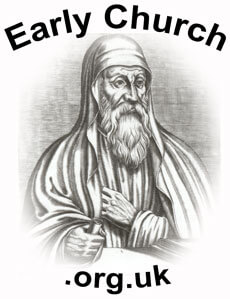Synopsis
ULPHILAS, the Apostle of the Goths
(313-383). According to the Arian church historian,
Philostorgius (Hist. Eccl., 2, 5), whose statement is corroborated by
other Greek church historians, he belonged to a Cappadocian family which was
carried away from its homestead as prisoners of war by the Goths, but which
soon found itself so well installed among the captors, and so closely allied to
them, that the son received a Gothic name, Wûlfila ("Little
Wolf"). He was educated in Christianity and in Greek learning, and on account
of his great natural gifts he was destined for the church. The Goths, at that
time settled on the northern bank of the Danube, just outside the pale of the
Roman Empire, were rank heathens; but they were converted by Ulphilas. His
missionary labor among them must have begun very early; for in 343 he was
ordained their bishop, probably by an Arian bishop, since he himself afterwards
declared that Arianism had always been his faith. How successful his work was
may be inferred from the fact that the Gothic chief Athanaric became
frightened, and instituted a violent persecution in 350. But Ulphilas obtained
permission from the Emperor Constantius to immigrate with his flock of converts
to the Roman Empire, and to settle in Moesia near Nicopolis, at the foot of
Mount Haemus. Meanwhile the mission among the Goths north of the Danube did not
stop its work; and in 370 a new persecution brought a new flock of Gothic
converts into the Roman Empire under the protection of the Emperor Valens.
Shortly after, a Gothic chief, Frithigern, embraced Christianity, his whole
tribe following his example; and finally Athanaric himself was won for the new
faith, which simply meant that the conversion of the whole Gothic nation was
completed. They were Arians; and on Jan. 17, 383, a council was opened in
Constantinople for the purpose of bringing about a reconciliation between the
Arian Goths and the Orthodox Greek Church. It is probable that Ulphilas was
present at that council. Its purpose, however, was not accomplished. See the
art. GOTHS.
In his missionary work, Ulphilas had use,
not only for his natural gifts, but also for the accomplishments of his
education. One of his most effective means of success was, no doubt, his
translation of the Bible into the vernacular tongue of the Goths, for which he
had to invent a new alphabet, a combination of Greek and Runic letters: it is
the oldest existing monument of any Teutonic language. Whether he translated
the whole Bible, or only portions, is doubtful: only fragments have come down
to us. Seven codices have been discovered, - Codex Argenteus, written on
purple vellum in gold and silver letters, dating from the sixth century,
discovered in 1597 in the Benedictine abbey of Werden, now preserved in the
library of Upsala, and published with diplomatic accuracy by Uppstrom (1854); Codex Carolinus, discovered in the library of Wolfenbuttel in 1756, and
published in 1762-63; finally, palimpsest fragments of five codices discovered
in the Ambrosian library at Milan by Angelo Mai, and published 1819-38. The
best collected editions of these fragments are those by Von der G abelentz and
Loebe, Leip., 1836-46, with Latin version, grammar, and lexicon; E. Bernhardt,
Halle, 1875, with full critical notes; and Stamm, Paderborn, 1878 (7th ed. by
M. Heyne), the most convenient manual edition. Compare also The Gothic and
Anglo-Saxon Gospels in Parallel Columns with the Versions of Wycljffè
and Tyndale, by Jos. BOSWORTH, London, 1874, 2d ed.; and SKEAT: The
Gospel of St. Mark in Gothic, Oxford, 1882, with glossary, grammar, and
notes.
"ULPHILAS," Philip Schaff, ed., A
Religious Encyclopaedia or Dictionary of Biblical, Historical, Doctrinal, and
Practical Theology, 3rd edn, Vol. 4. Toronto, New York & London: Funk
& Wagnalls Company, 1894. p.2416.
 |
Philosturgius, Church History 2.5. |
 |
Socrates, Church History 2.41;
4.33-34. |
 |
Sozomen, Church History 4.24;
6.37. |
 |
Theodoret, Church History 4.33 |
 |
T.D. Barnes, "The Consecration of
Ulfila," Journal of Theological Studies 41.2 (1990):
541-545. |
 |
G.W.S. Friedrichsen, The Gothic
Version of the Gospels: A Study of Its Style and Textual History. London:
Oxford University Press, 1926. |
 |
G.W.S. Friedrichsen, The Gothic
Version of the Epistles: A Study of Its Style and Textual History. London:
Oxford University Press, 1939. |
 |
M.J. Hunter, "The Gothic Bible," G.W.H.
Lampe, ed. The Cambridge History of the Bible, Vol. 2. Cambridge:
Cambridge University Press, 1969. pp.338-362. |
 |
John
F. Matthews, The Goths in the Fourth Century. Translated Texts for
Historians, 11. Liverpool: Liverpool University Press, 1991. Pbk. ISBN:
0853234264. pp.205. |
| |
 Ruth A. Tucker, From Jerusalem to Irian Jaya: A Biographical History of Christian Missions, 2nd edn. Grand Rapids: Zondervan, 2004. Hbk. ISBN-13: 978-0310239376. pp.34-37. Ruth A. Tucker, From Jerusalem to Irian Jaya: A Biographical History of Christian Missions, 2nd edn. Grand Rapids: Zondervan, 2004. Hbk. ISBN-13: 978-0310239376. pp.34-37. |
 |
Hagith Sivan, "Ulfila's Own
Conversion," Harvard Theological Review 89.4 (1996): 373-386. |
 |
Edward
Arthur Thompson, The Visigoths in the Time of Ulfila. Oxford: Oxford
University Press, 1966. Hbk. ISBN: 0198142544. pp.198. |
Related Subjects
 Ruth A. Tucker, From Jerusalem to Irian Jaya: A Biographical History of Christian Missions, 2nd edn. Grand Rapids: Zondervan, 2004. Hbk. ISBN-13: 978-0310239376. pp.34-37.
Ruth A. Tucker, From Jerusalem to Irian Jaya: A Biographical History of Christian Missions, 2nd edn. Grand Rapids: Zondervan, 2004. Hbk. ISBN-13: 978-0310239376. pp.34-37.










